Social media reputation management continues to be the lifeblood of enhancing your overall online reputation.
When Birdeye conducted a survey, we found some impressive social media statistics:
- 81% of the respondents handle social media on the corporate level
- 24% of the respondents have employees at individual locations
This was interesting because one of the reasons why one of our customers, Valley Veterinary Care, opted for Birdeye’s social media management software is that they felt “when things look like they were generated by a corporate entity, it just doesn’t feel as authentic.”
Because they have 75 unique social media accounts across Facebook, Instagram, and Twitter, they must tailor all of their content to match each local audience’s specific needs and preferences.
Today, when feeling relatable and personalizing each communication is a priority for brands to offer an exceptional customer experience, using social media reputation management to your advantage can be incredibly beneficial.
Dive into our blog for the ultimate guide on social media reputation management, and learn how software tools like Birdeye Social can simplify your workload and enhance your online presence.
Table of contents
- What is social media reputation management?
- Why social media reputation is essential for brands?
- How does reputation management factor into your overall social media strategy?
- How does social media impact overall brand awareness and reputation management for organizations?
- How has social media affected reputation risk management?
- How to develop a social media reputation management strategy?
- 5 dos and don’ts of social media reputation management
- Birdeye – The social media reputation management software to consider for any business
- Best practices for social media reputation management
- Use of AI to build a positive reputation on social media
- What are a few successful tips for brand reputation management on social media?
- Successful social media reputation management examples
- How has Birdeye benefited Valley Veterinary Care in its social media reputation management?
- FAQs on social media reputation management
- Master social media reputation management with Birdeye Social
What is social media reputation management?
Social media reputation management (SMRM) refers to monitoring, influencing, and managing a brand’s reputation on various social media platforms. It involves a proactive approach to building a positive online presence while mitigating potential risks and addressing negative feedback promptly.

Why social media reputation is essential for brands?
Social media platforms serve as lightning-fast conduits for information. A single post, whether positive or negative, can reach a vast audience within seconds.
The collective opinion on social media can shape public perception. Negative comments or controversies can quickly tarnish a brand, emphasizing the need for a proactive approach to reputation management.
Here are key reasons why social media reputation is essential for brands:
- First impressions matter
- Building trust and credibility
- Influencing consumer decision-making
- Word-of-mouth marketing
- Competitive advantage
- Customer engagement and loyalty
- Crisis mitigation
- Recruitment and partnerships
- Global reach and impact
1. First impressions matter
Well-established brands curate their social media profiles with visually appealing content and a consistent brand voice. This strategic presentation ensures users have a positive initial encounter, setting the stage for a favorable brand perception.
2. Building trust and credibility
Brands actively engage in transparent communication on social media platforms. Sharing behind-the-scenes content, customer testimonials, and responding promptly to inquiries contribute to an authentic and credible online presence.
3. Influencing consumer decision-making
Customers trust eCommerce review sites to share and read experiences about products/services in real-life scenarios.
Brands, using this as their user-generated content on social media can benefit immensely as positive reviews create social proof that significantly influences potential buyers.
4. Word-of-mouth marketing
Brands incentivize customers to share their experiences through referral programs or branded hashtags. This encourages positive word-of-mouth and helps the brand track and engage with user-generated content.
5. Competitive advantage
A strong social media reputation sets a brand apart from competitors in a crowded marketplace. A brand can showcase its strengths and gain a competitive edge by more effectively identifying gaps in competitor strategies or addressing similar concerns.
6. Customer engagement and loyalty
Social media allows for direct customer communication. Responding promptly to customer inquiries, addressing concerns, and showing appreciation for positive feedback builds a sense of loyalty among their customer base.
7. Crisis mitigation
A positive social media reputation acts as a buffer during times of crisis.
Whether it’s a product recall or a public relations issue, a prompt and transparent response can mitigate damage and demonstrate accountability.
Brands with a solid reputation have a reservoir of goodwill to draw upon, helping them weather challenges more effectively.
8. Recruitment and partnerships
Job seekers and potential business partners often use social media to find a company’s reputation. Sharing employee testimonials, highlighting workplace initiatives, and participating in industry discussions attract top talent and create a positive impression for potential partners.
9. Global reach and impact
Luxury brands use multilingual and culturally relevant content to appeal to a global audience. These brands create an internationally resonant positive impact by acknowledging and celebrating diverse cultures.
Must read: 9 questions you should ask to crack the code of social media reach
All these make it an effective reputation management tool for brands.
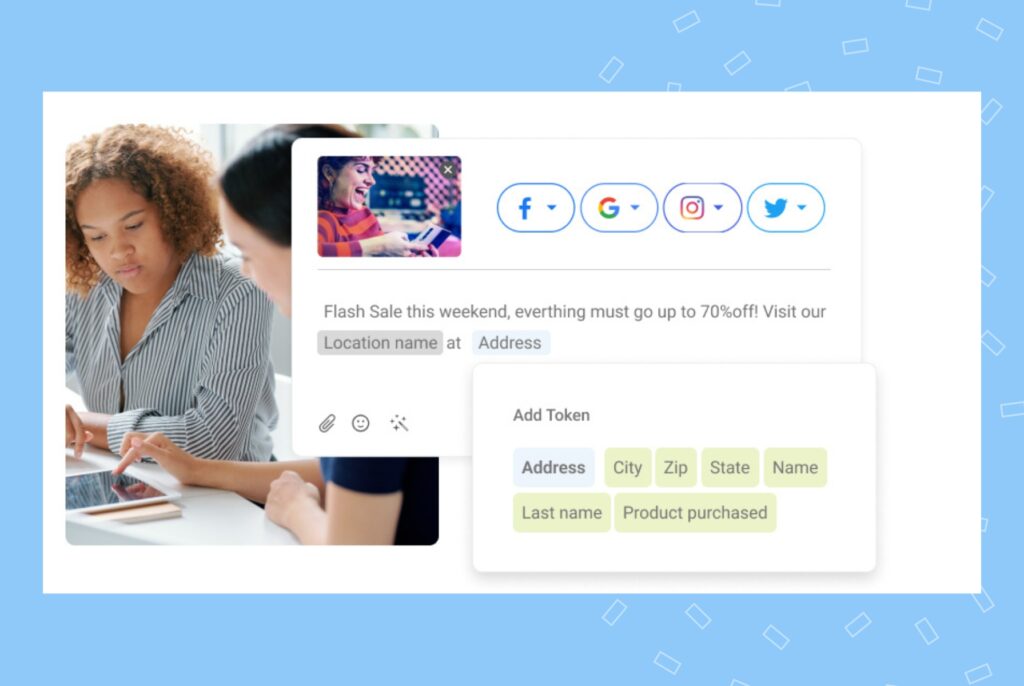
How does reputation management factor into your overall social media strategy?
Online reputation management is not a standalone activity but an intertwined aspect of your broader social media strategy. It influences how your brand is perceived, shapes consumer interactions, and contributes to the success and sustainability of your presence.
Here are some specific ways in which reputation management factors into an overall social media strategy:
1. Adaptation to algorithm changes
Social media platforms frequently update algorithms, affecting content visibility.
Reputation management involves staying informed about these changes, adjusting content strategies to align with algorithm updates, and ensuring consistent visibility to your target audience.
2. Humanizing the brand voice
Consumers connect more with humanized brands.
Company reputation management facilitates showcasing the human side of your brand through storytelling, employee features, and relatable content, fostering a deeper connection with your audience.
3. Real-time engagement
Social media demands real-time interaction.
Reputation management includes active monitoring for mentions and engagement opportunities. Responding promptly to trends, comments, and messages enhances your brand’s real-time presence and responsiveness.
4. Diversity and inclusion advocacy
Customers value brands that prioritize diversity.
Reputation management integrates initiatives and campaigns that promote diversity and inclusion. This commitment resonates positively with a diverse audience, shaping a brand image that values equality.
5. Monitoring industry trends and insights
Social media is a hub for industry discussions and trends.
Reputation management involves actively monitoring industry-related conversations, extracting insights, and leveraging this information to position your brand as a thought leader.
6. A/B testing for content optimization
Content effectiveness varies among audiences.
Reputation management incorporates A/B testing strategies to optimize content based on audience preferences. Analyzing the performance of different content types helps refine your overall social media strategy.
These points emphasize the community-building and data-driven aspects of reputation management within the broader local social media strategy context.
How does social media impact overall brand awareness and reputation management for organizations?
Social media shapes organizations’ overall brand awareness and reputation management strategies. The influence is long-term and multifaceted.
Here’s a comprehensive overview of how social media impacts brand awareness and reputation management:
1. Social media influencers enhance a brand’s credibility and contribute to a favorable reputation.
2. Brands actively participating in relevant social media trends and discussions position themselves as industry authorities.
3. Since social media provides rich analytics like engagement metrics and sentiment analysis, this data-driven approach contributes to refining brand strategies.
4. Brands that create shareable and impactful content have more chances of going viral, exponentially expanding brand reach.
5. Unlike other advertising channels, social media enables targeted campaigns. to specific demographics, locations, or interests. This targeted approach enhances and allows for nuanced reputation management strategies.
All these reasons prove that social media impacts an organization’s overall brand awareness and reputation management. Just like a positive brand image on social media can positively influence, a possible risk can also negatively impact its credibility.
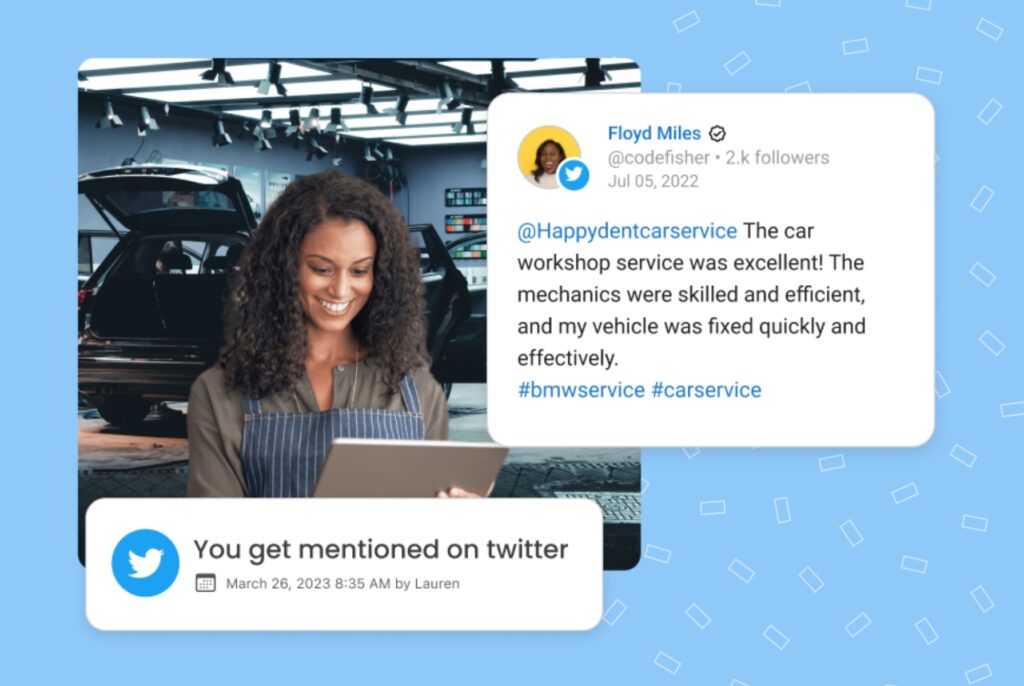
How has social media affected reputation risk management?
Social media has profoundly transformed reputation risk management by introducing unprecedented challenges and new business opportunities.
On one hand, the real-time nature of these platforms requires a dynamic and proactive approach to safeguard a brand’s image. Alternatively, immediate responses and crisis management are essential to mitigate potential damage before misinformation spreads extensively.
Here’s a tabular representation of the impact of social media and how brands can effectively use it for their reputational risk management:
| Impact of social media | Affects on reputation risk management |
| Social media accelerates the spread of information | A single social media post can reach audiences worldwide, amplifying the potential impact of positive or negative sentiments on reputation. |
| Social media trends can significantly impact brand perception | Organizations must stay vigilant, monitor social conversations, and be prepared to respond strategically to mitigate the impact of such trends. |
| Social media users demand transparency | Organizations need to be open about challenges, proactive in addressing issues, and willing to communicate transparently to maintain trust. |
| Social media demands interactive crisis communication. | Organizations can use social media to share updates, address concerns, and provide information by maintaining a proactive stance to deal with any sudden reputation risky events. |
| Social media raises data privacy challenges. | Organizations must prioritize data privacy, implement robust security measures, and communicate effectively in case of any incidents. |
| Social media content has a lasting digital footprint. | An old negative review or controversial post can resurface, necessitating ongoing reputation management efforts to maintain a positive image. |
Organizations must navigate the challenges posed by the speed and interconnectedness of these platforms while leveraging them strategically to enhance brand resilience and maintain a positive public image.
The key lies in embracing social media's dynamic nature and adopting a proactive social media reputation management strategy to manage reputation risks effectively.
How to develop a social media reputation management strategy?
Here’s a 10-step system to develop your social media reputation management strategy.
- Conduct a social media audit
- Identify existing reputational strengths and weaknesses.
- Evaluate audience engagement levels and sentiment.
- Define clear objectives
- Clearly outline your reputation management goals on social media.
- Define specific metrics for success, such as improved sentiment, increased engagement, or a reduction in negative mentions.
- Identify key platforms and audience
- Determine which social media platforms are most relevant to your audience.
- Understand the demographics and behaviors of your target audience on each platform.
- Implement social media engagement tools like Birdeye Social
- Track how followers interact with your social content.
- Measure success, understand results, and optimize your social strategy.
- Create a crisis response plan
- Clearly define roles and responsibilities within your team.
- Establish a communication protocol for addressing issues promptly.
- Encourage positive user engagement
- Encourage user-generated content that showcases positive experiences with your brand.
- Respond promptly and courteously to customer inquiries and feedback.
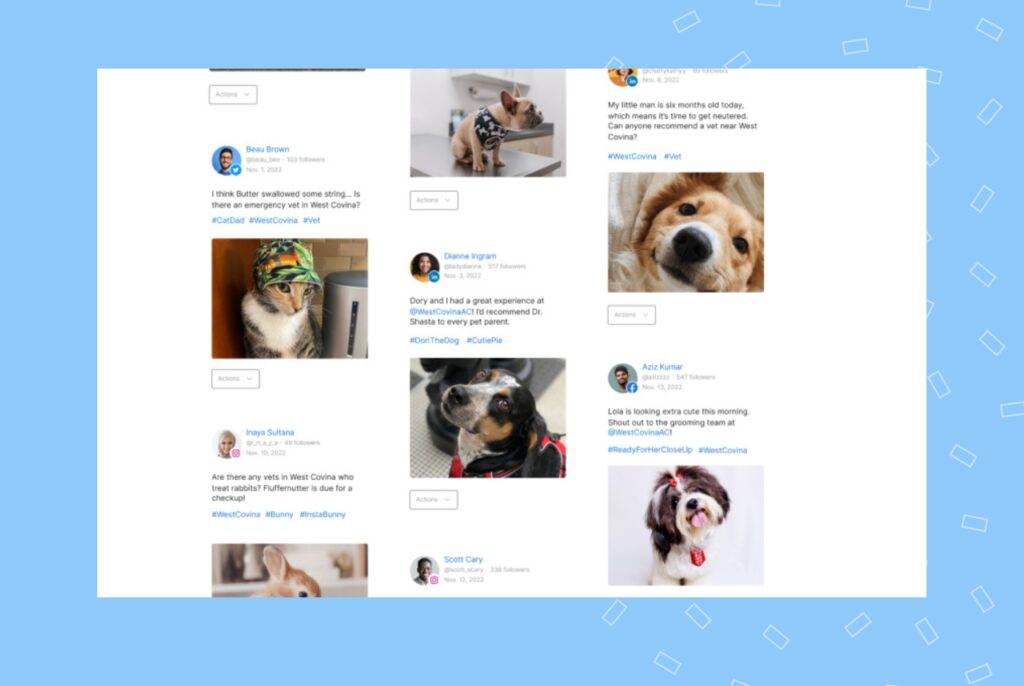
- Employee social media training
- Educate them on responsible social media usage.
- Encourage employees to be brand advocates while adhering to guidelines.
- Monitor competitor activity
- Learn from their successes and failures to inform your strategy.
- Identify areas where your brand can differentiate and excel.
- Gather customer feedback
- Use feedback to improve products/services and address recurring issues.
- Showcase positive feedback on social media to build credibility.
- Regularly evaluate and adjust
- Analyze key performance indicators (KPIs) and adjust strategies based on the data.
- Stay agile and adapt to changes.

5 dos and don’ts of social media reputation management
Dos and don’ts are specific actions to be followed or avoided. They guide the execution of reputation management strategies as practical guidelines for day-to-day social media interactions.
Here are some social media reputation management dos and don’ts we follow at Birdeye, and we recommend you do it too:
5 dos of social media reputation management
1. Do monitor brand mentions actively
It allows for swift responses to positive engagement and prompt crisis management when faced with negative sentiments.
2. Do engage positively with your audience
Responding to comments, messages, and mentions in a friendly and helpful manner contributes to a positive brand perception.
3. Do share relevant content
Providing valuable content showcases your expertise, builds credibility, and positions your brand as an authoritative source.
4. Do address negative feedback professionally
Professionally addressing negative feedback provides an opportunity to turn a negative customer review into a positive one.
5. Do establish clear brand guidelines
Clear brand guidelines ensure consistency in messaging and visual representation. Consistency builds brand recognition and trust among your audience.
5 don’ts of social media reputation management
1. Don’t ignore negative feedback
Acknowledging and addressing concerns shows that you value customer opinions and are committed to improvement.
2. Don’t engage in online arguments
Engaging in arguments on social media can harm your brand’s reputation.
3. Don’t share controversial or offensive content
Sharing controversial or offensive content can alienate your audience and damage your brand image.
4. Don’t neglect social listening
Staying attuned to online conversations helps you proactively manage potential issues and capitalize on positive opportunities.
5. Don’t neglect employee social media guidelines
Employees are ambassadors for your brand. Neglecting social media guidelines for employees can lead to inconsistent messaging and potential reputational risks.

Birdeye – The social media reputation management software to consider for any business
Looking for an AI-powered social media publishing software for multi-location businesses that can:
- Generate social posts in minutes
- Monitor engagement
- A centralized dashboard to manage all locations
- Schedule multiple posts and track them in an intuitive visual calendar
- Help you get past writer’s block and generate fresh ideas every time
- Effortlessly craft compelling holiday social media posts with just a few clicks
- Provide you access to royalty-free images & media
- Shrink your links
- Track and view all likes, comments, shares, and reactions in one place
- Measure and optimize performance across various social channels and locations
- Identify top-performing content
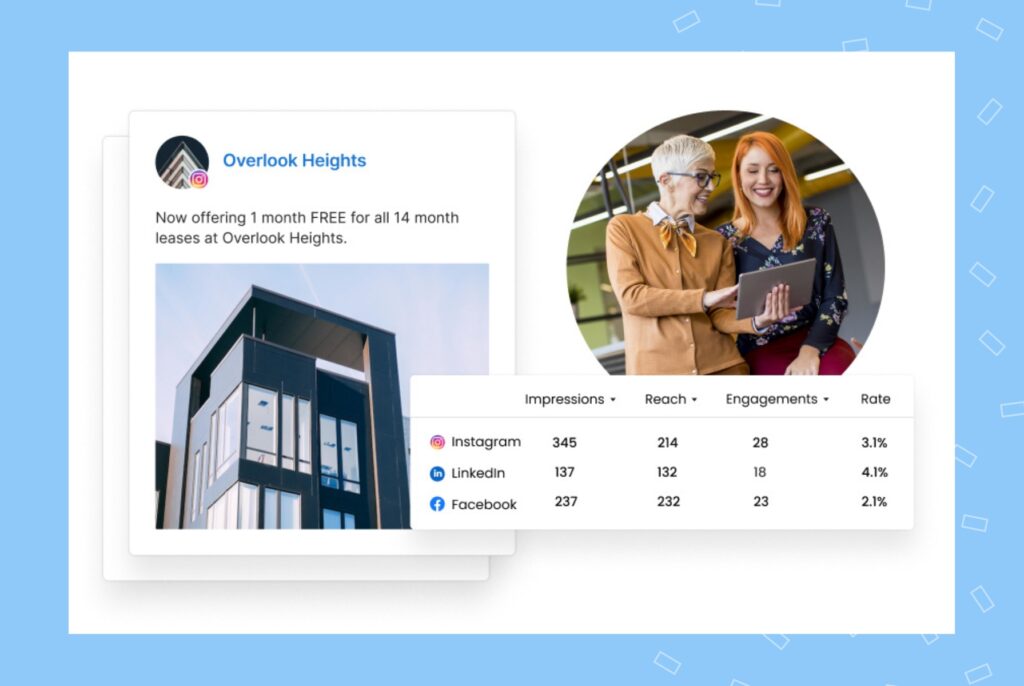
Then Birdeye Social is your go-to social media reputation management tool.
Birdeye removes multiple-point solutions and becomes a one-point source to manage reputation, engage consumers, and deliver a great customer experience.
Social media reputation management made easy with Birdeye Social
Want to see the impact of Birdeye on your business? Watch the Free Demo Now.
Best practices for social media reputation management
Here are some actionable practices successful brands use in their social media reputation management:
- Implement interactive content such as polls, quizzes, and challenges.
- Create and manage branded online communities.
- Encourage users to create and share content related to your brand.
- Use short-form videos for storytelling on TikTok or Instagram Reels.
- Launch advocacy campaigns aligned with social causes.
- Implement AI tools for advanced sentiment analysis.
- Host virtual events and experiences.
Adopting these practices ensures your social media reputation management remains adaptive, innovative, and aligned with evolving digital trends.
Use of AI to build a positive reputation on social media
AI in social media management goes beyond automation and personalization.
Birdeye’s Social is powered by BirdAI to deliver personalized experiences, elevate business outcomes, and connect with your customers hassle-free without adding resources.
With it, you can:
- Auto-create posts for holidays, special occasions, or industry-specific events.
- Get access to the holiday calendar by country.
- Complement posts with relevant, auto-suggested images.
- Customize your brand-specific prompts to auto-create custom posts.
- Fix any grammar mistakes in your content.
- Add and edit images without hassle.
- Get a high-level view of engagement in every platform.
- Amplify your best reviews to share on social media.
Schedule a free demo with our social media expert to learn how Birdeye Social can help you manage, publish, and engage seamlessly.
What are a few successful tips for brand reputation management on social media?
Here are a few successful tips for effective brand reputation management on social media:
- Maintain consistency in your brand messaging.
- Have a proactive and transparent approach to crisis communication.
- Showcase authenticity in your social media content.
- Collaborate with influencers strategically aligned with your brand.
- Prioritize a customer-centric approach in interactions.
- Provide transparent and accurate information about your products or services.
How to respond to negative social media comments? Responding to negative comments allows brands to turn a potential crisis into a positive experience. Follow the methods to deal with them: 1. Acknowledge the comment promptly 2. Apologize for any inconvenience caused 3. Offer a solution or explanation 4. Thank the commenters for their feedback
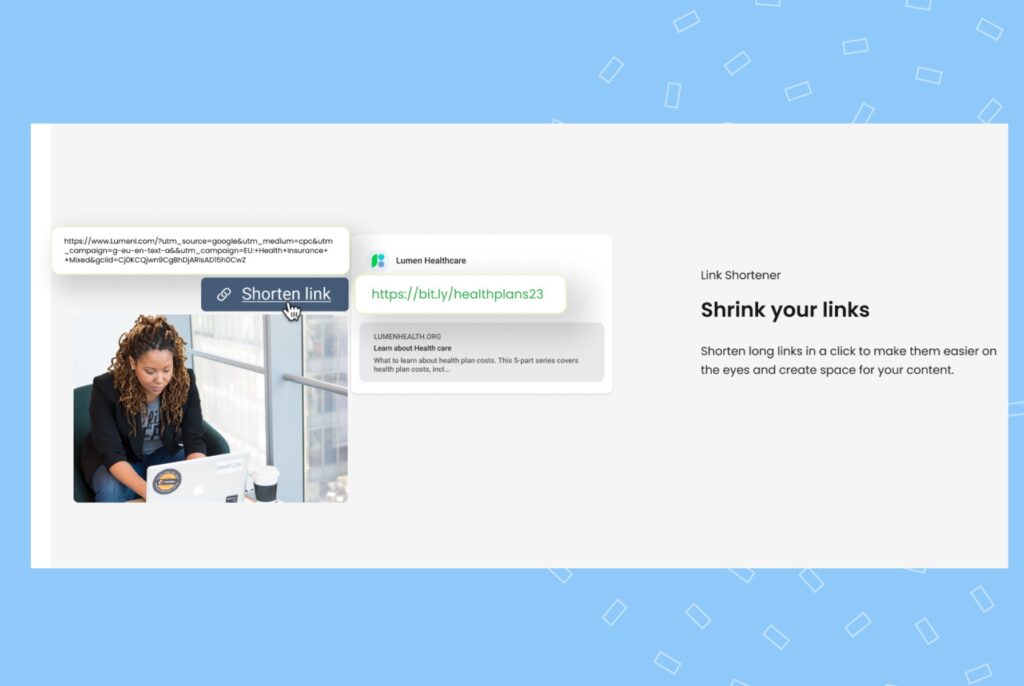
Successful social media reputation management examples
Examples of companies that turned social media challenges into opportunities:
1. Airbnb’s power of transparent communication
Challenge: Airbnb faced a reputation crisis when instances of property damage and unruly guests made headlines.
Strategy: They responded swiftly, acknowledging the issues and outlining concrete steps to address them. They implemented a host guarantee program and enhanced screening processes.
Outcome: Airbnb’s transparent communication and proactive measures restored trust and positioned it as a leader in responsible hosting.
2. How Dove turned a controversy into a positive message
Challenge: Dove faced criticism for a social media advertisement perceived as racially insensitive.
Strategy: Rather than remaining silent, Dove issued a public apology, vowing to improve its review processes for ads. They also engaged in a dialogue with their audience, listening to concerns and demonstrating a commitment to diversity.
Outcome: Dove’s sincere response and commitment to change diffused the situation and enhanced their reputation as a brand that values inclusivity.
3. Oreo’s timely and creative responses during Super Bowl
Challenge: Oreo faced a potential PR crisis when a blackout occurred during the Super Bowl.
Strategy: Leveraging the real-time nature of social media, Oreo responded with a clever tweet: “You can still dunk in the dark.” This showcased their wit and turned a potential negative event into a marketing win.
Outcome: Oreo’s quick thinking and creativity garnered widespread praise, reinforcing its brand as one that can capitalize on unexpected moments.
4. JetBlue’s proactive customer engagement
Challenge: JetBlue faced negative publicity after flight delays and cancellations.
Strategy: Instead of waiting for customers to voice their frustrations, JetBlue actively communicated about the issues, apologized sincerely, and implemented a comprehensive customer bill of rights.
Outcome: JetBlue’s proactive approach not only placated affected customers but also positioned them as a brand committed to transparency and customer satisfaction.
These case studies highlight the importance of proactive communication, transparency, and creative problem-solving in successful social media reputation management. By learning from these examples, you can navigate challenges resiliently and build a positive online presence.
How has Birdeye benefited Valley Veterinary Care in its social media reputation management?
Valley Veterinary Care is a group of veterinary hospitals and wellness clinics with locations across Texas, Colorado, and California.
“Our customers think of their vet as the other family doctors. They stick with us for multiple generations and the lifetime of their pet. So, our social posts need to reflect those connections. When things look like they were generated by a corporate entity, it just doesn’t feel as authentic.”
– Meghan S. Bingham, CVPM, Senior Operations Manager, Valley Veterinary Care
Given the diverse locations within their organization, Valley Veterinary Care established separate social media profiles for each of its 24 locations, totaling 75 unique social media accounts across Facebook, Instagram, and Twitter. This approach made it important for their content to be tailored to each local audience’s specific needs and preferences.
Challenge: Managing social media across 24 locations can be daunting, especially while ensuring consistency and quality in content. Valley Veterinary Care wanted a centralized approach, but there was a concern that content might appear too corporate and lose its local touch. They wanted their audience to feel a genuine, personalized connection online without tedious processes.
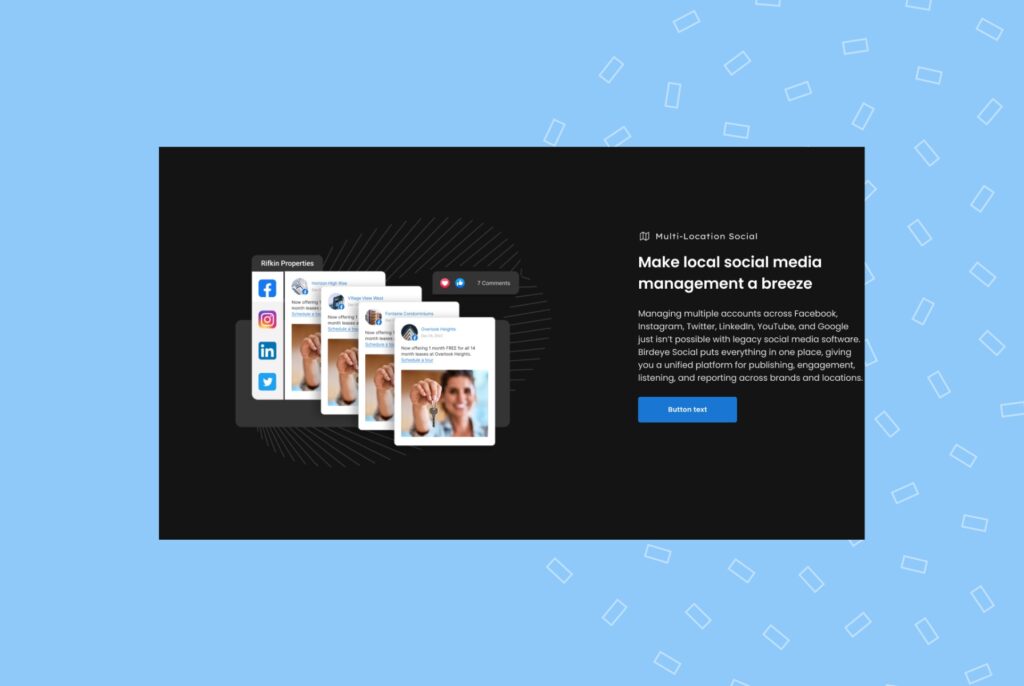
That is when they opted for Birdeye Social.
Solution: With Social, Valley Veterinary Care balanced corporate consistency and local authenticity. They seamlessly shared compelling, informative, and relevant content that resonated with a broader audience while preserving each location’s unique charm and character.
With tools like Birdeye Socialm, the content calendar, personalized tokens, and location-based reporting, they created a steady flow of authentic and engaging content. This made their reputation management on social media simpler.
“Birdeye Social allows us to post across locations while still connecting with our communities. We can post in bulk while keeping the voice of the practice without the tediousness of posting individually to each account.” Meghan S. Bingham, CVPM, Senior Operations Manager, Valley Veterinary Care
FAQs on social media reputation management
Birdeye offers an all-in-one solution. Explore Birdeye Insights for SEO, Birdeye Social for social media, and Birdeye’s comprehensive platform for SEM and online reputation management.
Birdeye is a company that does both online reputation and social media management. All of Birdeye’s products are powered with AI to help you manage your reputation effectively.
It involves monitoring and influencing how a brand is perceived on social platforms. Birdeye Social, for instance, aids in tracking sentiment, managing reviews, and enhancing online reputation.
Actively engage with your audience, respond to feedback, showcase positive experiences, and use tools like Birdeye Social for sentiment analysis and review management.
Social media shapes public opinion and affects crisis communication. Birdeye’s tools help monitor online sentiment, enabling proactive reputation management and crisis response.
Be transparent, respond promptly, and use Birdeye Social for real-time monitoring. Proactive reputation management and open communication are key.
Role of a social media reputation manager: Manages a brand’s online image, responds to feedback, and utilizes tools like Birdeye Social for sentiment analysis, review management, and proactive reputation building.
Consistently engage with your audience, address concerns promptly, and use tools like Birdeye Social for monitoring sentiment and managing online reviews.
Respond to negative feedback, address concerns, showcase positive experiences, and use tools like Birdeye Social to actively manage and improve online reputation.
Master social media reputation management with Birdeye Social
Follow these tips and best practices to make social media reputation management a USP of your business.
Ready to elevate your customer experience? Schedule a call with our expert today!

Originally published









